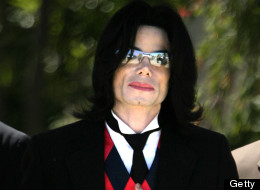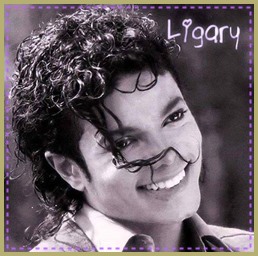-
ligary.
Michael Jackson Death Trial: Dr. Stuart Finkelstein Says He Thought Singer Had Drug Problem

Pop superstar Michael Jackson gestures to his supporters as he departs from the Santa Barbara Superior Court in Santa Maria, California following the 59th day of Jackson's child molestation trial. May 24, 2005 (Photo by E. Neitzel/WireImage)
By ANTHONY McCARTNEY 07/08/13 04:19 PM ET EDT
LOS ANGELES — A doctor who treated Michael Jackson during a 1993 concert tour that had to be canceled when the singer entered rehab testified Monday about the signs that led him to conclude the singer had a problem with prescription pain medications at the time.
In videotaped testimony, Dr. Stuart Finkelstein said he was later asked by concert promoter AEG Live to act as Jackson's personal physician during the ill-fated "This Is It" tour in 2009 but wanted to know if Jackson was "clean."
AEG executive Paul Gongaware said he didn't believe Jackson had any prescription drug issues, Finkelstein testified.
Finkelstein's testimony was recorded during a February deposition that was played for jurors hearing a negligence lawsuit by Jackson's mother against AEG Live LLC. Katherine Jackson claims AEG failed to properly investigate another doctor who later gave her son an overdose of the anesthetic propofol and that the company ignored warning signs about her son's health.
Finkelstein said he first suspected Jackson had a dependence on pain medications in 1993 while working on the "Dangerous" tour. He recounted spending 24 hours in the singer's hotel suite and administering morphine intravenously to deal with Jackson's pain.
He said he gave Jackson morphine during their first meeting because the singer's buttocks were scarred from previous unspecified treatments and he was concerned about giving an injection of the painkiller Demerol.
He said he also noticed that Jackson appeared to have a high tolerance for morphine and had on a patch that administered another opiate drug.
Finkelstein said he gave Jackson one other painkiller treatment before the "Dangerous" tour was halted after what he described as an intervention by Elizabeth Taylor and others in Mexico City.
The doctor, who now specializes in addiction medicine and works for concert promoters treating injuries to performers, said he relayed his concerns about Jackson's painkiller use to Gongaware, then a "Dangerous" tour worker.
Gongaware is now a top AEG Live executives and a friend of Finkelstein, the physician said.
Finkelstein said he and Gongaware had five to 10 conversations in 2009 about working on Jackson's "This Is It" shows. Finkelstein said he wanted $40,000 a month and was not hired.
Jackson died after Dr. Conrad Murray administered an overdose of the anesthetic propofol on June 25, 2009. Murray, who agreed to work on the "This Is It" shows for $150,000 a month, provided Jackson with propofol as a sleep aid.
AEG Live denies it hired Murray and says it bears no responsibility for Jackson's death.
Finkelstein is the first medical professional who treated Jackson to testify in the case, now in its 11th week.
Last week, jurors heard from addiction medicine specialist Dr. Sidney Schnoll, a paid expert witness who said he did not see anything in Jackson's medical history that indicated the singer was addicted to any medications. His analysis was based on medical records that dated back to the late 1990s, after the "Dangerous" tour.
Finkelstein said many of his records involving his "Dangerous" tour treatment of Jackson had been stolen.
http://www.huffingtonpost.com/2013/07/08/m..._n_3562807.html@@@@@@@@@@@@@@@@@@@@@@@@@@@@@
traduzione google
Michael Jackson morte Trial: Dr. Stuart Finkelstein dice che pensava cantante aveva problemi di droga
LOS ANGELES - Un medico che curò Michael Jackson durante un tour 1993 concerto che ha dovuto essere annullato quando il cantante è entrato riabilitazione testimoniato Lunedi circa i segni che lo hanno portato a concludere il cantante ha avuto un problema con antidolorifici al momento.
Nella testimonianza videoregistrata, il dottor Stuart Finkelstein ha detto che è stato poi chiesto da concerto promoter AEG Live to agire come medico personale di Jackson durante la sfortunata "This Is It" tour nel 2009, ma voleva sapere se Jackson era "pulita".
AEG esecutivo Paul Gongaware ha detto di non credere che Jackson aveva problemi di droga di prescrizione, Finkelstein ha testimoniato.
La testimonianza di Finkelstein è stato registrato durante una deposizione di febbraio che è stato giocato per giurati sentire una causa negligenza della madre di Jackson contro AEG live LLC. Katherine Jackson pretese AEG omesso di indagare adeguatamente un altro medico che poi ha dato al figlio una dose eccessiva di anestetico propofol e che la società ignora segnali di allarme circa la salute di suo figlio.
Finkelstein ha detto di primo sospettato Jackson aveva una dipendenza da farmaci per il dolore nel 1993 mentre lavorava nel tour "Dangerous". Ha raccontato la spesa 24 ore di sole suite del cantante e la somministrazione di morfina per via endovenosa a che fare con il dolore di Jackson.
Ha detto che ha dato Jackson morfina durante il loro primo incontro, perché le natiche della cantante sono stati segnati da precedenti trattamenti non specificati e lui era preoccupato di dare una iniezione di Demerol antidolorifico.
Ha detto che ha anche notato che Jackson sembrava avere una elevata tolleranza per la morfina e aveva su una patch che somministrato un altro farmaco oppiaceo.
Finkelstein ha detto che ha dato Jackson un altro trattamento antidolorifico prima che il tour "Dangerous" è stato fermato dopo quello che ha descritto come un intervento da Elizabeth Taylor e altri, a Città del Messico.
Il medico, che ora si specializza in medicina dipendenza e opere per organizzatori di concerti trattamento delle lesioni agli esecutori, ha detto che ha trasmesso le sue preoccupazioni circa l'uso antidolorifico di Jackson a Gongaware, poi un "Dangerous" tour lavoratore.
Gongaware ora è un top manager AEG Live e un amico di Finkelstein, il medico ha detto.
Finkelstein ha detto che lui e Gongaware aveva cinque a 10 conversazioni nel 2009 di lavorare su di Jackson "This Is It" mostra. Finkelstein ha detto che voleva 40 mila dollari al mese, e non è stato assunto.
Jackson è morto dopo che il dottor Conrad Murray ha somministrato una dose eccessiva di anestetico propofol il 25 giugno 2009. Murray, che ha accettato di lavorare sul "This Is It" mostra per 150 mila dollari al mese, disponibile Jackson con propofol come un aiuto di sonno.
AEG live nega assunto Murray e dice che non ha alcuna responsabilità per la morte di Jackson.
Finkelstein è il primo medico che ha curato Jackson a testimoniare nel caso, giunto alla 11 ° settimana.
La scorsa settimana, i giurati sentito da dipendenza medicina specialista Dr. Sidney Schnoll, un perito pagato che ha detto di non aver visto nulla nella storia della medicina di Jackson che indicava il cantante era dedito a tutti i farmaci. La sua analisi si è basata su dati medici che risaliva alla fine del 1990, dopo il tour "Dangerous".
Finkelstein ha detto che molti dei suoi dischi che coinvolgono il suo trattamento tour "Dangerous" di Jackson erano stati rubati.
___.
TRIAL-JACKSON FAM vs AEG LIVE ONLY NEWS |


